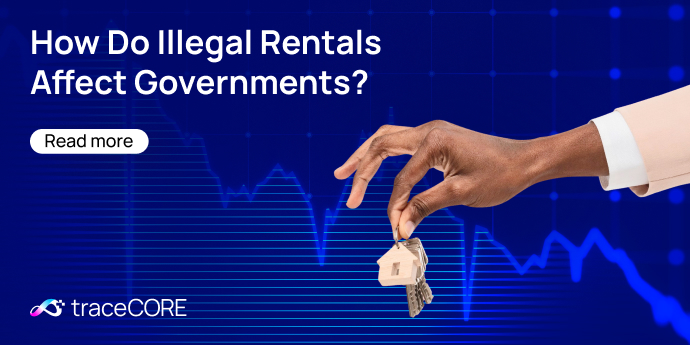Rental Registration System
traceCORE Rental Registration System: The Key to a Transparent Rental Market

Across the globe, the informal rental housing market presents a hidden but significant challenge for governments. Landlords operating under the radar often do not declare their rental income or register tenancy contracts — resulting in a shadow economy that undermines public finance, social protections, and urban development.
This lack of oversight creates a ripple effect: lost tax revenue, unregulated rental practices, weakened tenant rights, and unreliable data for national planning.
For governments aiming to modernize their housing sectors and improve tax compliance, there is a comprehensive, technology-driven solution: traceCORE Rental Registration System.
In this post, we examine the core issues stemming from unregistered rentals and explain how the solution offered by traceCORE provides a scalable path toward transparency, accountability, and equitable housing.
Challenges Governments Face Due to Unregistered Rentals
As the number of unofficial rentals continues to grow, governments are increasingly forced to deal with a number of issues.
Loss of Tax Revenue
When landlords rent properties without declaring income, governments lose critical revenue needed to fund public services and infrastructure.
This tax leakage continues unchecked in many regions due to weak enforcement and lack of oversight.
For example, in Uganda’s Greater Kampala Metropolitan Area, over 90% of landlords were found to be evading rental income tax as of 2021, according to the URA.
Lack of Reliable Data
Governments can't manage what they can't measure.
The absence of reliable data on rental activity limits policymakers’ ability to plan effectively, allocate resources, or assess housing needs.
For instance, this systematic review on housing informalities notes how informal rental units often operate in legal grey zones, making it hard for city authorities to incorporate them into housing strategies, enforce regulation, or assess supply vs. demand.
Weak Tenant Protection
Tenants in informal arrangements often have no legal recourse if disputes arise.
This increases their vulnerability to unfair evictions, unsafe living conditions, or arbitrary rent hikes.
Housing Quality Decline
Without regulation or incentives to reinvest, landlords may neglect property maintenance, resulting in poor living conditions and long-term structural deterioration in urban housing.
Urban Planning Difficulties
Informal rental activity makes it difficult for cities to plan public transport, sanitation, and infrastructure efficiently.
It also fuels inequality as formal landlords compete unfairly with untaxed, unregulated competitors.
Investor Uncertainty
Developers, banks, and institutional investors are less likely to finance or support housing projects when ownership records, rental contracts, and income streams lack verification or legal enforceability.
This stifles innovation, limits housing supply, and increases long-term costs for everyone involved.
The Solution: traceCORE Rental Registration System
To counter these challenges, traceCORE has developed a cutting-edge digital system that formalizes rental activity while simplifying the process for all stakeholders.
What is traceCORE Rental Registration System?
traceCORE Rental Registration System is an online platform (available via web or mobile app) that enables the secure registration and monitoring of rental agreements.
It integrates landlords, tenants, tax authorities, and government regulators in one seamless digital environment.
How does the system work?
Account Creation
Landlords, tenants, or their representatives register on the platform.
Document Upload
Lease agreements and identity documents are submitted digitally.
Fee Payment
Necessary registration fees are processed online.
Government Review
Tax authorities review, verify, and register the tenancy.
Digital Monitoring
All transactions, communication, and payments are logged and traceable.
Key Benefits of traceCORE Rental Registration System
For Governments:
-
Revenue Recovery: Every registered rental becomes a taxable unit.
-
Market Visibility: Access to real-time rental data nationwide.
-
Policy Efficiency: Better planning for housing, transport, utilities, and more.
-
Corruption Reduction: Digital systems minimize opportunities for bribery or fraud.
-
Dispute Resolution: Legal framework for handling tenant–landlord conflicts.
For Landlords:
-
Legal Compliance: Protection under the law.
-
Efficient Management: A centralized dashboard to manage multiple properties.
-
Tenant Vetting: Improved due diligence.
-
Market Stability: Fair pricing and enforcement of lease terms.
For Tenants:
-
Legal Protection: A valid, enforceable rental contract.
-
Utility Access: Registered tenants can connect utilities and set up phone, TV, and Internet services.
-
Transparency: Full visibility into terms, rent amounts, and property rights.
-
Dispute Resolution: Protection from wrongful eviction or harassment.
By shifting rentals from the informal to the formal sector, traceCORE helps build a housing ecosystem that is stable, fair, and future-ready.
To learn more about the system and its features, visit this page.
Conclusion
Governments worldwide are grappling with the hidden costs of informal rentals: lost revenue, tenant vulnerability, and a lack of data for proper planning. traceCORE Rental Registration System offers a powerful solution — bringing the entire ecosystem into the light.
A formalized rental market doesn’t just help the state — it builds confidence for landlords, security for tenants, and a reliable framework for investors. The transition is no longer optional; it’s essential.
With traceCORE Rental Registration System, governments can finally unlock the full potential of their housing markets — creating cities that are more just, efficient, and resilient.

